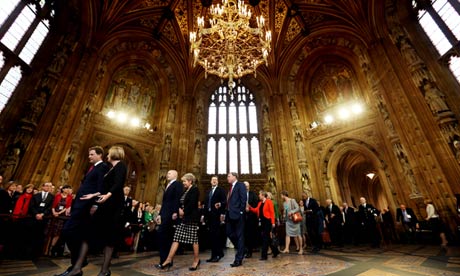Corporations and outside interest groups have funnelled more than £2.2m in sponsorship, research support and freebies to MPs and peers through all-party parliamentary groups, a rise of 22% since last year, Guardian research reveals.
Patrick Mercer was forced to resign last week after a fake lobbying firm asked him to set up an all-party parliamentary group for Fiji. The sting operation by BBC Panorama / the Daily Telegraph has once again thrust these cross-party groups under the spotlight.
Late Monday, the Speaker suspended 80 Commons passes pending a standards committee inquiry into the all-party parliamentary groups (APPGs) groups which he began last year and which now has greater urgency.
Today Guardian research shows that the level of sponsorship, gifts and funding from these groups has risen for the second year running.
The value has increased by 22%, up from £1.8m which previous research revealed last year. The number of APPGs has also increased from 450 last year to 589 of these informal cross-party groups, each of which are listed as part of the register of MPs financial interests.
The ‘gifts, benefits and hospitality‘ received through these groups includes:
• A grant of £65,000 from BT to support the parliament choir. A full list of choir members is unavailable from their public site which requires a password.
• A donation of £40,000 from Barclays and £40,000 from Prudential to the Trade and Investment group.
• The Internet and Communications Technology group has the largest sums at its disposal – £0.2m including donations from Google, Vodafone and BT. Chinese firm Huwei, currently being investigated by parliament’s intelligence and security committee for its relationship with BT, also donated £200,000 to the group.
• £8,227 and £5,227 from Heineken and Carlsberg respectively, donated to the Beer APPG.
• The ‘continence care’ all-party group receives support from theAbsorbent Hygiene Products Manufacturers Association which acts as the group’s secretariat.
Peers and MPs were able to issue security passes to those working on APPGs, allowing them unsupervised and regular access to much of parliament and its accompanying offices – although this practice washalted on Tuesday after continued allegations about lobbying.
Members can also expect to be invited on trips abroad, a benefit listed in eight of the groups which the Guardian looked at. These included a visit to Hong Kong for the China APPG which was paid for by the Hong Kong government as well as a visit to Nigeria, £12,500 of which was provided by Shell International.
Other potential perks include travel to, dinner, and racing covered for members of the Greyhound group, and tickets to matches for members of the Rugby League APPG.
These groups allow those outside parliament to engage in informal discussion with MPs interested in a particular topic. There are, however, concerns that these groups also provide a channel for lobbyists to gain influence.
Guardian research identified that more than 60 (10%) of APPGs received some form of support from lobbying firms. The Skin APPG, whose purpose it is “to raise awareness of skin conditions” was one of many groups to have a consultancy firm providing its secretariat – a form of support which is not costed and therefore excluded from the total benefits received. Bellenden, a firm “specialising in political, planning and corporate communications”, whose clients include the Dispensing Doctors’ Association, oversees the £29,500 which the Skin APPG receives from various donors.
The research, compiled using ScraperWiki to gather data from the official register, is the third year that the Guardian has investigated these groups. The register is automatically updated every six weeks, and covers the previous 12 months to that date (most recent update at the time of writing is 29 April 2013). Since registration of a donation can be after this has actually taken place, it should be noted that the values provided here are estimates.
These new findings come as the Prime Minister faces additional pressure to deal with lobbying – an issue which he warned in 2010 would be “the next big scandal”.
Downing Street announced on Monday that a bill which would create a register of lobbyists would be brought before Parliament before the summer recess next month.
Read the full data on all-party groups at guardian.co.uk/data
http://www.guardian.co.uk/uk/2013/jun/04/mps-lords-perks-all-party-groups
.
.

